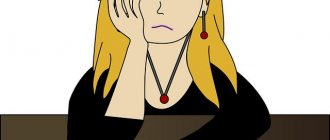Decidophobia is a psychological disorder in which a person is afraid to make significant decisions.
Making an important decision is a process that requires considerable emotional effort, even for a self-confident person. Choosing priorities and taking key actions often determine a person’s entire future life.
Excessive passivity and excessive timidity in dealing with serious issues may be a consequence of a psychological disorder - decidophobia.
Decidophobia is a relatively young disease and was first described in 1973 by Princeton University professor Walter Kaufman.
Decidophobia is a consequence of suppression of the emotional-volitional sphere of a person. The ability to make responsible decisions is the prerogative of the emotional-volitional sphere of the individual. In order to avoid serious problems with the choice of life priorities, the will must be developed in accordance with the person’s age. The formation of a persistent and decisive character begins in childhood. A key role in the development of the ability to solve life problems is played by the forms of education existing in the child’s family and the characteristics of the parents.
At the age of 8–12 years, a person is psychologically ready to act independently and take responsibility for his actions. But for normal activity, children require the trust of adults and their relative non-interference. If at this stage of character development the parent suppresses the child’s volitional sphere, an infantile personality is formed (psychological infantilism). And an overly developed form of infantilism can represent decidophobia.
Possible reasons
- The parent’s desire to provide help to the child even where it is not required.
- Excessive guardianship, organizing life in such a way that the adult himself solves all the problems of his child. Painful fear of overly caring for the child.
- Dictatorship, parental demand for unquestioning obedience, imposition of opinions and their views on life, prohibition on choosing an activity (an adult himself chooses a hobby or a group of interests without taking into account the child’s opinion).
- Excessive criticism for mistakes and nagging, as a result of which children lose the desire to act.
- Labels: “you can’t do anything”, “you can’t handle it”. Over time, the child accepts such attitudes and believes in them.
- Encouragement to accept the majority opinion.
The development of will is also influenced by the general atmosphere in the family. If, due to life circumstances (divorce, death of her husband), the character of the child’s mother has changed dramatically, from an affectionate woman she has turned into a demanding parent, the baby experiences severe stress. Being confused, not understanding what is happening and not knowing how to act in unfamiliar circumstances, the child may prefer silent submission to the elder.
Other causes of decidophobia
A persistent fear of choice can also be observed in people with normally developed will. Pathological fear is a consequence of a “wrong” decision once made, which entails serious consequences . Decidophobia may hide fear of failure, shame or criticism, and fear of responsibility.
How to stop being afraid of responsibility?
In severe cases, hypengiophobia can paralyze any manifestations of activity and make its carrier a social outcast.
10 ways to stop fear of responsibility from ruining your life:
- Changing attitudes towards mistakes. Instead of self-flagellation, you should develop the habit of answering the questions “what was done well?” and “what can we do better next time?”
- Stop putting off making a decision. Developing the habit of taking immediate action will significantly reduce stress and improve your quality of life.
- Learn self-support. A useful skill will be the ability to praise and reward yourself for actions taken. It is recommended to introduce the practice of daily affirmations - repeated positive phrases.
- Meditation, yoga. These practices relax the body as much as possible, relieve muscle tension, and relieve emotional tension.
- Take responsibility more often, bringing what you start to the end. Inaction generates fears, energetic steps create confidence. Completeness will give an optimistic outlook on the situation and removes the problem of fear of responsibility.
- Cultivate self-confidence. Healthy self-confidence encourages behavioral acts and reduces anxiety in conditions of uncertainty.
- Complete rest, daily routine. It is necessary to give the body time to reboot in order to maintain rational thinking and an even emotional state.
- Practice making commitments. Voluntary acceptance of responsibility reduces fear of problems and becomes a resource for confronting phobias.
- Realize the irrationality of fears by sorting them into pieces. Writing out problems and associated fears will significantly reduce your anxiety level. Analyzing what is written to see if problems are unsolvable will help enhance the effect.
- Work with a specialist. This method gives the most stable result. A professional psychologist-hypnotherapist will teach you how to cope with anxiety and not be afraid of responsibility.
Like any disease, hypongiophobia will not go away on its own. Gradually releasing irrational anxiety and making your commitments more challenging will help you overcome your fear of commitment. Working with a specialist, such as Nikita Valerievich Baturin, can correct a person’s self-image, teach them to accept their own imperfections and develop tolerance for failures.
Manifestation of decidophobia
A person suffering from this anxiety disorder experiences strong emotional stress directly when it is necessary to make a decision or when thinking that the moment will come when it is necessary to make a choice. However, a decidophobe can be completely calm when thinking about approaches to a problem and when considering various options for the development of events.
Most people suffering from decidophobia do not worry when they have to make minor everyday choices (for example, which store to go to). Decidophobes often focus the attention of others on this “ability” to make decisions.
However, severe cases of the disorder are known, in which, due to pathological fear, people are unable to independently solve basic everyday problems . In such circumstances, the patient needs a permanent guardian.
In most cases, decidophobes adapt well to life in society.
People suffering from the disorder prefer positions where decisions are made by superiors or proactive colleagues. In family life, decidophobes voluntarily become dependent on their partner. Phobiaphobic men may prefer strong, older women. Representatives of the fairer sex, who do not know how to make decisions, choose caring, enterprising and strong-willed men as life partners.
Symptoms
During a panic attack, a person begins to feel dizzy and may feel nauseous, even to the point of vomiting and loss of consciousness. The heart is beating so fast that thoughts of a heart attack arise, because at the same time there is also a strong pounding in the chest.
Breathing becomes frequent and shallow, due to which the amount of oxygen in the blood becomes so large that a paradoxical thing happens - the person suffocates.
Which is even more frightening. After all, death from suffocation seems extremely painful and undesirable in principle, especially at the moment.
And getting even more frightened, he, accordingly, begins to gasp for air even more often, bringing himself to the point of hysterics. After all, the symptoms are only getting worse.
Blood pressure rises, stomach hurts, sweating increases. The brain perceives the cause of fear as a mortal danger, so it goes into “survival” mode.
Adrenaline is released into the blood so that the phobe can escape. What he happens and tries to do. Only the tunnel consciousness prevents us from adequately perceiving the surrounding reality.
A person is so absorbed in anxiety that he does not notice obstacles in his path, which is why he injures himself. For example, falling down the stairs or crashing into a wall.
There were situations when people simply “went out” out the window, their feelings were so overwhelming at such a moment that they were simply unable to orient themselves and saw only one way out, so to speak, a path to salvation from the room in which danger arose.
Consequences of decidophobia
With decidophobia, a person prefers to “go with the flow” and chooses a strategy of waiting it out. People who are susceptible to fear hope that the problem that has arisen will be resolved on its own or with the help of an outsider. This is what makes decidophobes turn to psychics, magicians and fortune tellers for help.
Phobia makes a person an easy prey for religious propagandists and sects.
With this disorder, the individual turns into a completely controlled personality; the phobia does not allow development and self-realization. In some cases, this causes a feeling of worthlessness. Self-confidence is completely lost.
Ways to avoid responsibility
The problem of fear of responsibility is a developed habit, reinforced by repeated repetition. The human psyche shows miracles of ingenuity where it is necessary to change established patterns of behavior. Gravitating toward stability, the psyche resists change. A person unconsciously looks for ways to avoid obligations.
The main methods include:
- Procrastination, or putting off important tasks until later. Instead of doing the main job, a person does secondary things. May get stuck on social networks for a long time or devote hours to online games. The result is often careless performance of the task, accompanied by feelings of guilt.
- Bad habits. Alcohol, smoking, overeating - these methods of escaping reality for a while help get rid of the psychological oppression of obligations. Being destructive in nature, they harm the psyche and physical health of the individual.
- Shifting responsibility. Conventionally, this strategy is called “loser behavior.” The individual justifies his inaction by unfavorable external factors. Blaming other people helps you avoid commitment without feeling guilty.
Treatment of decidophobia
Decidophobia can be treated, but getting rid of this disorder is a long process. Often psychologists begin to work with a patient only if the decision about treatment was made by the patient himself . Such a step can be very difficult for a patient, so he needs constant support from relatives.
When treating the disease, the following are used:
- therapeutic methods,
- hypnosis,
- relaxation methods,
- methods that teach emotion management skills,
- medications (if it is necessary to stop intense attacks of fear)
As an independent work, you can take active actions:
- Imagine only the best scenarios for the development of events, think positively about the future.
- Communicate more with brave, strong and energetic people.
- If the issue is successfully resolved, praise yourself.
- Try not to exaggerate the significance of the problem.
- Overcoming yourself, participate in situations that cause discomfort.
- Stay active even if you make a mistake.
Ranging
First you need to think about the issues on which decisions are made. It is very important to be able to determine what is more important at the moment. Successful people often use rankings in accordance with their intended goals.
Also at this stage it is advisable to pay attention to your moral values. Then, if you fail, you can be proud that you remained true to your principles. This helps many people survive failure. It is much easier for them to analyze the results of their actions and then develop new plans.
Making decisions using the Cartesian square
If there is an urgent need to decide on a goal, and there is no reliable adviser nearby, then the “Descartes Square” decision-making . This technique allows you to consider an exciting issue from four sides, see the best option and hear yourself.
Descartes square looks like this:
A doubtful person needs to answer the questions posed in detail point by point. Recording the positive and negative consequences of taking an action (or inaction) will help you see which scenario is most favorable.
Recommendations
- Practice meditation and breathing techniques for relaxation. This way you will learn to feel your body, harmony within and calmness.
- Try to visualize a favorable outcome of events more often. As soon as you notice that panic appears, immediately begin to imagine something pleasant that causes joy, happiness, or at least a smile.
- Praise yourself even for taking a tiny step towards recovery. In this matter, maximalism will not help you at all.
- Watch your loved ones and friends. How do they cope with difficulties? How do they understand what they want? As a last resort, contact them for help. Just not so that they do some piece of work instead of you, but so that they share their experience of how they succeed.
- Every night before going to bed, try to concentrate on your body. What's going on in it? Maybe your legs ache, your back hurts, or your heel itches? When you can listen to your feelings without caution, move to the next level - try to notice what feelings you are experiencing. Then set the bar higher - be aware of your desires. This way, over time, planning and listening to yourself will seem like a normal task rather than a mortal danger.
Restrictions
How to learn to make decisions on your own? You can work on your discipline. It is extremely important to constantly set deadlines for yourself so that you can control your time and feel responsible.
Of course, this method may not work for everyone, since disorganized people often do not take deadlines seriously. If you are a very responsible person, then such a method will definitely help to consolidate your strong-willed decision with real conditions.
For many people, a timer works effectively because it does not allow you to relax, be lazy, or put off until a later date what can be done today. In addition, discipline develops a sense of confidence in a person.
Stress
Unfortunately, some life situations can cause us stress. At the same time, you often have to figure out how to learn to make decisions. Everyone understands perfectly well that during times of stress, healthy thoughts do not come to mind. Therefore, it is absolutely unreasonable to decide something while being angry, irritated, upset.
It is extremely important to try to calm down quickly. To do this, you need to weigh the situation using the experience of past decisions, and also try to picture the future in your head. You will have to delve deeper into the business in which you are interested. To do this, you need to study all the facts and materials in order to better understand the essence. Finally, try to remain objective. It's better not to make hasty conclusions.











